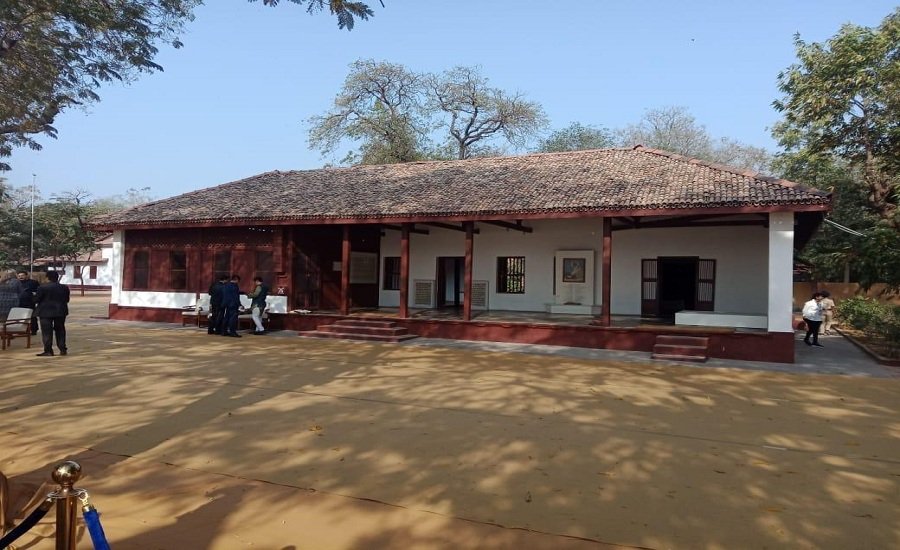The joint statement is titled as ‘Prevent Government takeover of Gandhian Institutions’
GANDHINAGAR – Around 130 eminent personalities from various segments of the country, opposing the Centre and Gujarat government’s joint plan to redevelop Sabarmati Ashram of Mahatma Gandhi in Ahmedabad through the Rs 1,200-crore ‘Gandhi Ashram Memorial and Precinct Development Project’, has criticised the move.
They came out with a statement on Wednesday, saying that the proposed project will “severely compromise simplicity and sanctity” of the present-day ashram and can be envisioned at best as “Gandhi Theme Park” and at worst “a second assassination.”
The around 130 eminent personalities led by the president of Gujarat Sahitya Parishad and noted Gujarati writer Prakash Shah, historians Rajmohan Gandhi and Ramchandra Guha, musician T.M. Krishna, retired High Court Judge A.P. Shah, Admiral (Retd) Laxminarayan Ramdas, former IAS officer Sharad Behar, former IPS officer Julio Ribeiro, senior lawyer Anand Grover and activists Harsh Mander and many other activists, writers, Gandhians and former IAS and IPS officers have opposed the Union government’s plan to ‘develop’ the historic Gandhi Ashram in Sabarmati, claiming that it will harm its sanctity.
“It was an attempt to take over Gandhian institutions”, they said in the statement.
The signatories also include social activists Shabnam Hashmi, Yogendra Yadav, Aruna Roy, Teesta Setalvad, writer and cultural activist G.N. Devy, filmmaker Anand Patvardhan, writer Ram Punyani and former IAS, artist and poet Gulam Mohammed Sheikh, journalist Kumar Ketkar, writer P. Sainath, among others.
The joint statement is titled as ‘Prevent Government takeover of Gandhian Institutions’.
“The present government is all set to ‘reclaim’ the ‘visual wholesomeness, tranquility and uncluttered environment of 1949’ and make it a ‘world-class’ tourist destination spread over 54 acres. It has announced a budget of Rs 1,200 crore for Gandhi Ashram Memorial and Precinct Development Project,” it says.
“We must collectively oppose any government takeover of Gandhian institutions, while ensuring that the government continues to use public money for the proper maintenance and upkeep of such institutions, in consultation with eminent Gandhians, historians and archivists from India and around the world,” says the joint statement.
“There will be new museums, an amphitheater, VIP lounge, shops, food court among other things in the newly created ‘world class’ memorial as per the newspaper reports.
“But, the place has never needed a ‘world-class’ makeover to attract tourists. The charisma of Gandhi along with the authenticity and simplicity of the place has been enough,” says the statement.
“Reports say that the project will be under the direct supervision of the Prime Minister and the Chief Minister. This is in keeping with the present government’s strategy to appropriate and commercialise all Gandhian institutions in the country. The worst example of this can be seen in Sevagram, but the most frightening aspect is government control over all Gandhian archives. As Mahatma Gandhi was murdered by elements whose ideology still inspires some of those in power in India, this danger cannot be overlooked,” it adds.
The Gandhi Ashram on the banks of the Sabarmati river, also known as Sabarmati Ashram, was where Mahatma Gandhi lived between 1917 and 1930 as he led the Indian Freedom Struggle. It is now managed by the Sabarmati Ashram Preservation and Memorial Trust.
Describing Hriday Kunj, the hut where Gandhi lived with his wife Kasturba between 1917 and 1930, and other historical buildings inside the Ashram will be pushed into a corner after the redevelopment according to the signatories.
“The proposed plan severely compromises and trivializes the sanctity and importance of the present-day Ashram, mainly Hriday Kunj, surrounding buildings and the museum. Hriday Kunj, other historical buildings, and present museums, even if they remain untouched, will no longer be central but pushed into a corner by the new museum, amphitheater, food courts, shops, etc.,” the statement reads.
“Hriday Kunj and the memorial museum greets thousands of visitors coming from all parts of the world daily in truly Gandhian fashion, without frisking or security check or sight of armed persons. The visitors also feel touched and inspired by the aesthetics, openness, and sanctity of the place. The museum building designed in the early 1960s by Charles Correa reflects all the above-mentioned values,” the statement further says.
The signatories are also planning to hold a meeting shortly to decide future course of action. -IANS

